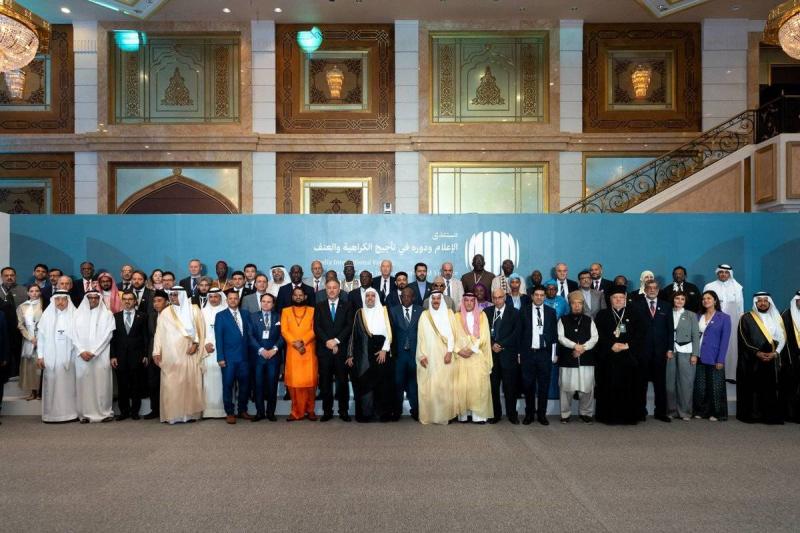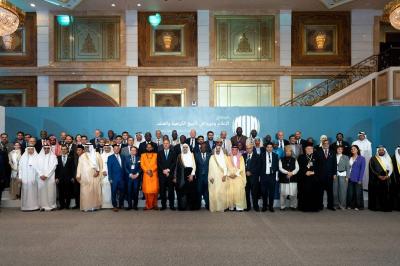Today, the "Jeddah Charter for Media Responsibility" was issued, concluding the International Forum "Media and Its Role in Inciting Hatred and Violence: Risks of Misinformation and Bias." The forum brought together the Union of OIC News Agencies, major international agencies, and prominent religious and diplomatic leaders from around the world. The charter includes 13 articles adopted by the leadership and institutions represented at the forum, along with 8 recommendations at the conclusion of the international gathering that included participants from around the world, especially heads and directors of Arab, Islamic, and international news agencies, as well as reporters from Gaza who face challenges in conveying the realities on the ground.
The charter's preamble highlights the need to express belief in the obligation to elevate the media system, enhance professional honor, affirm commitments from international organizations and professional institutions, and ensure respect for freedom of opinion and expression within the framework of its civilizational legitimacy that supports world peace and harmony among national communities.
It emphasizes the importance of ensuring the public's right to know the truth and access information presented objectively and neutrally, rather than through misleading and improvised narratives that distort transparency and mislead in documentation. It stresses reliance on the experiences accumulated by media practices to reach an enlightened community role.
The charter asserts that contemporary needs require the formulation of an international coalition to combat media misinformation, improve media performance and quality according to standards that represent media ethics and its obligations. Participants in the forum call on all media professionals worldwide to adhere to these ethics that align with shared media values and do not diverge, as a professional commonality that those who feel the responsibility of media should believe in, apart from any aims that could divert the media path from its noble message.
In this regard, they emphasize the following commitments:
1. Belief in human dignity and commitment to shared ethical standards, safeguarding human rights and respecting them, regardless of religious, national, ethnic identity, or others deserving respect for their existence and right to choose their legitimate orientations, while abstaining from broadcasting or publishing content that could affect the rights of others or violate their privacy.
2. Combatting negative phenomena and wrongful practices, addressing calls to spread vice and moral decay, or anything harmful to societies, or inconsistent with sound nature and universal human values.
3. Respecting religious and national symbols of nations and peoples, insisting that offending religious beliefs and sanctities does not fall under freedom of expression, but is an unethical exploitation of this noble value, leading only to further provocation of feelings, creating enmities, and escalating tensions.
4. Instilling a culture of conscious difference, respecting cultural and social diversity, maintaining community peace, harmony among its components, and fostering coexistence while considering scientific, objective, and ethical standards in criticism and dialogue.
5. Considering Islamophobia and other hateful and exclusionary ideas as a model of despicable racism that demonizes and excludes the other due to the inability to handle multiplicity, lack of engagement, or misunderstanding caused by isolation and arrogance, alongside entrenched hatred in some souls, indicating their level of human and ethical isolation.
6. Combating calls to violence, hatred, and racial discrimination, refraining from disseminating materials that feed extremism and terrorism or incite them, and working against anything that undermines the security of nations and communities or sows discord and conflict.
7. Blocking content related to violence and hatred, exercising complete caution against one-sidedness and biased controls, avoiding the publication of media materials that are offensive or derogatory to individuals or groups, condemning all forms of humiliation and disdain, and employing polite and refined language that preserves dignity, states the truth, ensures coexistence, and respects everyone.
8. Handling catastrophic and tragic events with sensitivity and awareness, using visual and linguistic materials professionally, and being cautious not to harm victims or those affected by transmitting painful or shocking details and images.
9. Practicing media work freely and independently, not subject to any form of pressure or influence, avoiding the exploitation of influence or authority to serve personal interests and achieve self-gain.
10. Committing to personal responsibility, embodying ethical and social values, refraining from deceptive and extortionate methods to obtain news, verifying its accuracy, and exercising wisdom in its coverage to contribute to enlightening the public opinion in a balanced and moderate manner, avoiding exaggeration and sensationalism, while steering clear of incitement to hatred and violence.
11. Feeling the honor of a profession based on objectivity and neutrality in receiving and presenting news, considering them the best expression of the truth that should reach the audience without exclusion, bias, or misleading.
12. Committing to legitimate means in obtaining information, avoiding unethical methods that violate the rights of others or infringe upon their privacy.
13. Relying on trusted, credible sources in news dissemination and reports, respecting copyright when quoting, ensuring the accuracy and precision of provided or published media content, avoiding fabrication, piracy, forgery, distortion, the dissemination of misleading news, or rumors.
The forum also called for several recommendations:
1. Establishing a unified international law that regulates the ethics of media work and approves qualifications for conscious media practice.
2. Creating national and international laws to deter all forms of hatred, including criminalizing institutions and individuals involved in such crimes, and producing official lists of their names to isolate them from the framework of honest media, warning about their dangers to the peace of our world and the harmony of its national communities.
3. Announcing the "Islamic News Agency Media Professionalism Award," to be awarded to government and non-governmental bodies and individuals committed to media values.
4. Providing protection for media reporters, criminalizing assaults against them or restricting their access to events and their transmission freely.
5. National and international support for anything that elevates the media message and contributes to raising awareness of its various concepts and implications.
6. Enhancing the media process to become a soft power serving humanitarian issues, supporting oppressed peoples, resolving conflicts, and promoting civilizational alliances among nations and peoples in facing concepts of hatred and theories of inevitable conflict and civilizational clash.
7. Establishing effective national and international monitoring bodies to monitor and detect warnings of hatred and work to mitigate its risks.
8. Calling for the ratification of the "Jeddah Charter for Media Responsibility" by international media institutions, to serve as a reference source and legal basis for understanding media work ethics and regulating its practice, along with its bylaws.




